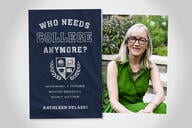You have /5 articles left.
Sign up for a free account or log in.
Alex Baldwin saw a need. As a freshman at the University of Texas at San Antonio in 2007, he said, his fraternity’s paper test files were too hard to track down. So, with a friend’s help, he scanned many of those files and started a password-protected website.
Before long, the password was removed and Baldwin invited fraternities at other colleges to scan and post their own test collections for the world to see. Thousands were visiting the site, which in January changed its name to Fratfolder.com and continues to solicit submissions. Some students are receiving e-mail promotions for the service right now, as finals loom.
Such files are already widespread within Greek houses, Baldwin said, so why not make them available for anyone? Baldwin wasn’t alone in that idea. Other digital test banks have come and gone in the last decade, usually incurring the wrath of faculty members but finding loyal student followings.
Tracy Mitrano, director of IT policy at Cornell University, said class materials are protected by copyright -- meaning it’s illegal to copy and repost them without receiving the faculty member’s permission. “More often than not, it’s the professor that has created it,” said Mitrano, who blogs for Inside Higher Ed. “It does qualify as original work and therefore the professor holds the copyright in it for as long as the professor lives plus 70 years.”
Baldwin, who said he doesn’t make any money from the site, said he’d be happy to remove any materials if a professor sends a letter proving that they own the copyright. (Cornell’s website has instructions on how to file such complaints.) As long as he removes the subjects of specific complaints, Baldwin said his conversations with lawyers make him confident the site is legal.
Baldwin said he’s received “hate mail” and threatening messages from faculty members, and Fratfolder’s home page features a plea from an unidentified Texas-San Antonio professor asking for his files to be taken down because “I use the same test questions for my exams.”
Baldwin sees his site as something of a public service, leveling the academic playing field by giving non-Greeks access to the same test banks while providing students insight into how individual professors structure their exams. And if professors don’t take the time to adjust their test questions each semester, Baldwin isn’t sympathetic.
“If you change your exams, it’s not a big deal,” he said. “All we’re doing is just democratizing access to these tests. Otherwise you have small communities that have access. That’s way worse.”
Today, Fratfolder is an undoubtedly national enterprise, with test files from most every type of institution from tiny community colleges to Ivy League universities. Most of the extensive repositories are from public research institutions.
At Cornell, veterinary students cramming to learn their goat breeds can check out a past test on the subject. Biochemistry students at the University of Illinois at Chicago have access to a final, complete with a pledge for test-takers to sign saying they haven’t cheated.
Francis Kofi Adams, a former assistant professor at Drexel University, is troubled by Fratfolder's concept. A copy of a fall 2010 final Adams gave in his construction management class is posted on Fratfolder.
“I am very concerned about this, especially since the particular exam posted bears a student’s name,” Adams wrote in an e-mail, adding that he believes the posting violates his copyright rights.
Of the 19 professors Inside Higher Ed contacted whose materials had been posted on Fratfolder, Adams was the only one who expressed concern. Four faculty members said they weren’t worried, while the 14 others either didn’t return a message or declined to comment. None of the professors who responded were aware, before being contacted by Inside Higher Ed, that their tests were on Fratfolder.
Wichita State University professor Stanley Longhofer is among the unconcerned. More than 50 of Longhofer’s past exams are posted on Fratfolder, along with several quizzes and notes from a few lectures. Longhofer finds the fact the files are scanned page by page amusing since he posts most of those same materials on his own website. He always changes the numbers in his problems, but is perfectly happy if students are familiar with the format of his tests.
“I have always felt since I was a student that it was really naïve for a faculty member to think an old exam wouldn’t be available to students,” Longhofer said, adding that his dorm floor once had an impressive collection of past tests. “If this is something that I want my students to learn, why won’t I give them as much practice information as I can?”
David Aadland, director of graduate studies at the University of Wyoming, is similarly unworried. Students can look at his tests on Fratfolder for general guidance, but he also changes his questions often. “All of my classes are at the Ph.D. level and I write new tests every year,” Aadland wrote, “so this doesn’t really bother me. I know that students have access to old exams. I’m okay with that as long as I write new ones. They can use the old ones as a study tool.”
Individual professors are certainly entitled to make their materials available, but Cornell’s Mitrano said faculty members should be the ones controlling access to their tests.
“We need everyone to be thinking hard about what academic integrity means in the digital age,” she said, “establishing clear rules and inculcating our students with this from right when they walk in the door.”




